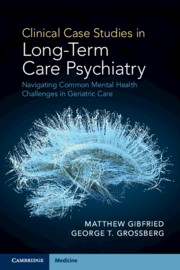 Clinical Case Studies in Long-Term Care Psychiatry
Clinical Case Studies in Long-Term Care Psychiatry Agitation in MNCD
Published online by Cambridge University Press: 31 October 2024
Agitation is a neuropsychiatric syndrome that is commonly seen in those with major neurocognitive disorders. Those demonstrating agitation can show increase in motor activity, restlessness, emotional distress, and physical or verbal aggression. Agitation is the third most common neuropsychiatric symptom in dementia after apathy and depression. Up to 80% of people with dementia experience some degree of agitation at some point during the course of the illness. The pharmacologic management of agitation in those with major neurocognitive disorders is complex and many studies have shed light on the topic.
To save this book to your Kindle, first ensure [email protected] is added to your Approved Personal Document E-mail List under your Personal Document Settings on the Manage Your Content and Devices page of your Amazon account. Then enter the ‘name’ part of your Kindle email address below. Find out more about saving to your Kindle.
Note you can select to save to either the @free.kindle.com or @kindle.com variations. ‘@free.kindle.com’ emails are free but can only be saved to your device when it is connected to wi-fi. ‘@kindle.com’ emails can be delivered even when you are not connected to wi-fi, but note that service fees apply.
Find out more about the Kindle Personal Document Service.
To save content items to your account, please confirm that you agree to abide by our usage policies. If this is the first time you use this feature, you will be asked to authorise Cambridge Core to connect with your account. Find out more about saving content to Dropbox.
To save content items to your account, please confirm that you agree to abide by our usage policies. If this is the first time you use this feature, you will be asked to authorise Cambridge Core to connect with your account. Find out more about saving content to Google Drive.